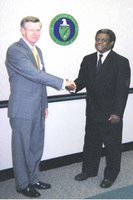 A civilization running on empty
A civilization running on emptyBy Anna Mundow May 21, 2006
In ''The Twilight of American Culture" (2000), historian Morris Berman warned that voracious consumerism and corporate greed were corroding American culture and fostering anti-American sentiment. Now, in ''Dark Ages America: The Final Phase of Empire" (Norton), Berman argues that US policy abroad and the erosion of democracy and civic culture at home have brought the nation to the verge of collapse. He spoke from his home in Washington, D.C.
Q: How did we get here?
A: In the book I focus on the structural properties of how we got here because claiming that it's George W. Bush is a very superficial analysis. I do consider Bush a discontinuity with pre-9/11 days, but there's also continuity with our foreign policy since World War II. Joe McCarthy said that McCarthyism was Americanism with its sleeves rolled up. Well, Bush is essentially Wilsonianism or Trumanism with the sleeves rolled up. We feel that the world is at our disposal. And when other nations move to protect their resources, for example, we get enraged and interpret it as anti-Americanism.
Q: Wasn't this imperial role forced on the US?
A: By the late 1790s, virtue here was defined as success for yourself and your family in a competitive market. We are still reaping the effects of that. We undertook, after all, to annex half of Mexico in the middle of the 19th century. That was hardly foisted on us; it was part of Manifest Destiny and a religious vision. But the real imperial role gets going after 1945, with the development of the national security state. And from the time of Truman until the present -- with one exception, Jimmy Carter -- nobody could become president unless they indicated that they were going to serve and expand the national security state.
Q: Isn't the war on terror protecting the American way of life?
A: The real question is where 9/11 came out of. Americans have trouble getting their minds around the fact that what happened on 9/11 was reactive rather than offensive. We had been doing certain things to the Arab and Islamic worlds for decades, and finally they decided they weren't going to take it anymore. That does not mean that it's OK for 3,000 citizens to get slaughtered, of course not. But are we interested in how many of their citizens we slaughter? How could they do this when we're so good? George Bush said. Well, examine the possibility, as Jimmy Carter suggested, that we're not all that good.
Q: Is the US prepared for the next attack?
A: If you mean the attack we're going to launch against Iran, I think the government is going to prepare us by rerunning all the cliches. Regarding an attack on us, I myself cannot see how the detonation of a nuclear device in some American city will not occur within the next decade. We might catch it in time, but . . . maybe not.
Q: What are our choices?
A: That we will not decline is not a option because it's built into the structure of how we live. We've really sealed our fate. At the end of the book I say that there are two possible paths: One is that we decline rapidly; the other is that we decline gradually. And you can have gradual decline if you exercise some intelligence as to your impact on other people, but that requires something that has historically never been our strong suit: empathy.
Q: Where will the US be internationally by, say, 2030?
A: We're riding various bubbles. One bubble is the belief that George Bush is protecting us from terrorism. Another is the illusion of economic well-being. By 2030, maybe a bit later, we'll be pretty much a second-rate power in the world. Remember that the shift in perception toward the British Empire only came with the [1956] Suez crisis. Well, we're heading for our very own Suez. How long before OPEC switches from dollars to euros, and a devaluation of at least 25 percent of the dollar results? How long before China, Japan, and the [European Union] stop floating enormous loans to us to support a wasteful consumer lifestyle? I mean, does everybody really need all this stuff?
Q: You don't think much of Christian fundamentalism?
A: Oh, it's a wonderful thing. Clearly it's the right path: flexible, engaged, empirical . . .
Q: You don't think much of Islam?
A: There are many Islamic scholars who agree that at some point it became frozen intellectually. Within Islam, as within Christian fundamentalism, you can't voice a criticism without generating an angry reaction.
Q: Aren't you advocating a form of fundamentalism yourself, a return to a pre-industrial age? A:Even if I thought that would be wonderful, it's not going to happen. The only way we will pull back is when the system crashes, something I do think is in the cards. And although I have a lot of problems with Martin Heidegger because of his association with Nazism, I think he was right when, referring to the role of technology and consumerism in our lives, he remarked, ''Only a god can save us now." There are, in other words, fundamental values we lost along the way.
Q: Do you feel at home in America?
A: A lot of the time I don't. What have we become, finally? A civilization dedicated to turning everything into a market. It's an empty vision, it seems to me, and that makes me sad. Surely the Founding Fathers had something better in mind, right?
Anna Mundow, a freelance journalist living in Central Massachusetts, is a correspondent for the Irish Times. She can be reached via e-mail at ama1668@hotmail.com.©
Copyright 2006 The New York Times Company
 Congratulations to Maryland Governor Robert Ehrlich, left, for getting the Intercounty Connector (ICC) approved. The much needed project has been languishing for decades. Governor Ehrlich announced federal approval of the project today and construction is expected to begin this Fall. The $2.4 billion ICC is an 18-mile east-west highway linking I-270 in eastern Montgomery County to I-95/US 1 corridors in northwestern Prince George's County. The Washington Metropolitan Area is finally starting to catch up on its transportation infrastructure needs. Now if we can get the subway system linked around the I-495 Beltway and an outer beltway, this region will be second to none and travel times will put families together faster.
Congratulations to Maryland Governor Robert Ehrlich, left, for getting the Intercounty Connector (ICC) approved. The much needed project has been languishing for decades. Governor Ehrlich announced federal approval of the project today and construction is expected to begin this Fall. The $2.4 billion ICC is an 18-mile east-west highway linking I-270 in eastern Montgomery County to I-95/US 1 corridors in northwestern Prince George's County. The Washington Metropolitan Area is finally starting to catch up on its transportation infrastructure needs. Now if we can get the subway system linked around the I-495 Beltway and an outer beltway, this region will be second to none and travel times will put families together faster.












 The Leonard Lopate Show
The Leonard Lopate Show





















